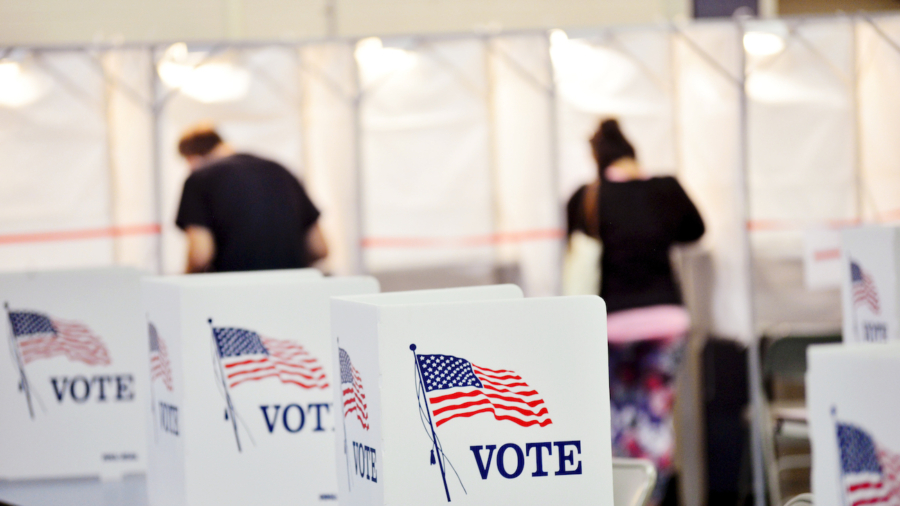The Chinese regime has leveraged the pandemic crisis to boost its interests while carrying out its influence operations ahead of the U.S. elections, the latest report from the Department of Homeland Security (DHS) found.
In its first-ever report on security threats to the United States released on Oct. 6, the DHS identified Beijing as a state actor that posed a “significant threat.” Among a list of concerns from China are disinformation campaigns, diplomatic pressure, and counterfeit medical products exported to the United States.
Reshaping Narratives
As the U.S. presidential election approaches, the Chinese regime will likely continue disinformation campaigns to “denigrate” the U.S. administration in an effort to reshape the U.S. narrative to its favor, the report said. State-directed cyber actors from China, Russia, and Iran could also undermine infrastructure related to the election and sow distrust among voters.
On Sept. 22, Facebook shut down more than 180 fake Chinese accounts, groups, and pages that spread Beijing’s talking points ranging from the South China Sea to Hong Kong.
The posts from these accounts included content both “in support of and against presidential candidates Pete Buttigieg, Joe Biden, and Donald Trump,” according to Facebook.
A Chinese hacking group known as Zirconium has also carried out thousands of attacks between March and September, targeting election campaign officials and prominent individuals, according to Microsoft. The hacking attempts resulted in 150 security breaches.
The Office of the Director of National Intelligence concluded, in a statement, that the Chinese regime “prefers that President Trump–whom Beijing sees as unpredictable–does not win reelection.”
A March study also tracked more than 10,000 fake and hacked Twitter accounts linked to the Chinese regime that spread virus-related propaganda.
Exploiting Economic Challenges
The Chinese regime views U.S. economic challenges, such as the downturn following the virus health crisis, as a “key opportunity to create a dependency” on China and boost its influence, according to the report. Beijing also has think tanks actively gauging which U.S. localities could be most susceptible to such exploitation.
The report noted how Beijing used sister city relationships to obtain critical health supplies from the United States when the COVID-19 outbreak first emerged in China.
In February, after Wuhan city was under lockdown as the world’s first and worst-hit virus epicenter, a charity group in its sister city Pittsburgh shipped over 450,000 surgical masks and 1,350 hazmat suits. Chinese media have touted the case as a model for sister city ties.
“Having a sister city is like having any other close friendship. You share each other’s triumphs and tragedies,” said Sarah Boal of Pittsburgh-based Brother’s Brother Foundation, the charity group that planned the shipment to China, in an interview with state media China Daily.
Several pro-Beijing local associations also established a GoFundMe account that raised more than $58,000 to supply Wuhan medical gear.
Chinese officials in Chicago also emailed a Wisconsin state senator in an attempt to get him to issue a resolution—already drafted by the Chinese consulate—proclaiming that Beijing succeeded in combating the outbreak. The efforts backfired and resulted in the senator, Roger Roth, introducing a bill to condemn the regime’s virus coverup.
“The reality is that most every state legislature in the country has probably received a letter from the CCP much like Senator Roth’s email as part of coordinated propaganda campaign,” said Secretary of State Mike Pompeo in a Sept. 23 speech.
While COVID-19 may have paused plans to bring officials on all-expenses-paid trips to China, a tactic Beijing had used to gain favor from U.S. officials, the regime is using other enticements such as real estate investments and giving discounts on medical supplies, the DHS report said.

Supply Chain Risks
Beijing, along with the Kremlin, pose the top threats to U.S. supply chain security, officials found. The report also named China as a “particularly persistent source” for counterfeit medical products during the outbreak.
In cracking down on substandard Chinese medical goods, U.S. authorities have seized over 1 million unapproved testing kits and 750,000 defective masks shipped from China, according to the report.
A recent independent medical product evaluation also found up to 70 percent of the Chinese masks tested “significantly inferior” to the U.S. standard.
During the pandemic, Beijing also collected intelligence on U.S. supply chain weakness, hoping to leverage the provision of critical commodities as a condition to win U.S. concession on issues the regime deems critical, the report noted.
Dangers of over-reliance on China in the medical supply chain became apparent during the pandemic, when Beijing hoarded large quantities of critical medical inventory from around the world despite a global shortage.
From The Epoch Times


